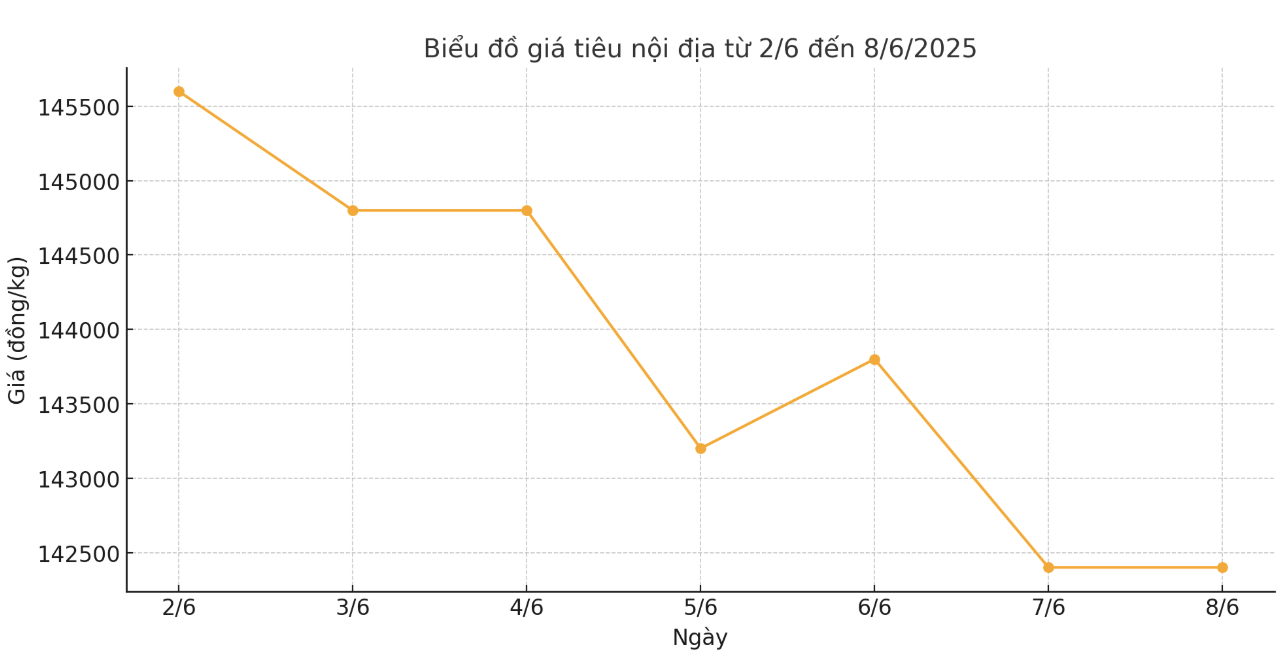Domestic pepper prices: Strong week of fluctuations
As of 11:30 today (6.), domestic pepper prices are trading between 142,000 - 143,000 VND/kg, down 1,000 - 3,000 VND/kg compared to last week, depending on the locality.
In Dak Lak province, pepper prices are being traded at 143,000 VND/kg, down 3,000 VND/kg compared to last week.
Pepper prices in Dak Nong also stood at 143,000 VND/kg, down 1,000 VND/kg last week.
Gia Lai - another locality in the Central Highlands region, pepper prices recorded a price of 142,000 VND/kg, down 2,500 VND/kg.
In the Southeast region, pepper prices in Ba Ria - Vung Tau and Binh Phuoc provinces have decreased by VND3,000/kg, currently trading at VND142,000/kg.

World pepper prices: The trend of price decline, except for the Indonesian exchange
Over the past week, black pepper prices in Brazil and Vietnam continued to decrease, with decreases of 500 USD/ton and 200 USD/ton respectively compared to last week, while Indonesia increased slightly by 10 USD/ton.
According to the International Pepper Association, the price of Indonesian black pepper is listed at 7,437 USD/ton, Malaysia black pepper is at a higher level of 9,100 USD/ton, while Brazilian black pepper ASTA 570 decreased to only 6,150 USD/ton.
At the same time of the survey, the price of Indonesian white pepper was at 10,142 USD/ton, up 17 USD/ton compared to last week. In particular, the price of white pepper exported to Malaysia ASTA remains stable at 11,850 USD/ton.
Vietnam's export black pepper prices of 500 g/l and 550 g/l have also been adjusted to 6,300 - 6,400 USD/ton. Vietnam's white sugar industry last week decreased by 200 USD/ton, down to only 9,300 USD/ton - the lowest level on the market.
Assessment and forecast
The United States is a country that does not produce pepper, so it depends entirely on imports, of which, 60 - 70% are imported from Vietnam. Therefore, right after the United States announced reciprocal taxes, the US Spice Association made a petition to President Donald Trump's administration, reflecting concerns about the unintended negative consequences that new tariffs can cause to the spice industry and consumers of this country.
For those reasons, the final counterpart tax rate for Vietnamese pepper imported into the US may not be high, thereby Vietnamese pepper still has opportunities in this market. In addition, Vietnamese enterprises can boost pepper exports to other markets to reduce pressure from counterpart taxes.











